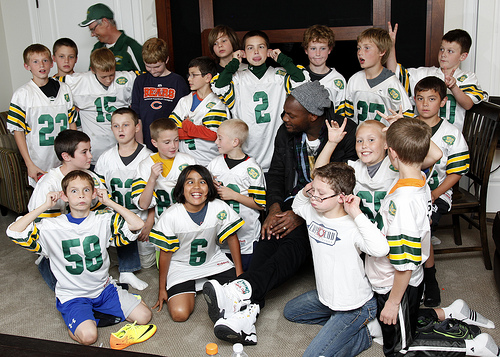
Not long ago I was talking to a mother who told me that her parents did “not approve of” her approach to her elementary school-aged son’s “less than stellar” grades. Have you ever been stuck in the middle between well-meaning grandparents and their grandchildren? Ouch.
As the conversation unfolded she shared a number of important thoughts. According to Mom, the young “offender” was (is):
– extraordinarily kind and compassionate
– a bundle of energy, excellent athlete, “good sport” and team player
– very curious and interested in learning
– socially skilled and fairly disinterested in grades
The prevailing wisdom –both from the school and from her parents — was that her son should be grounded from all sports, outdoor breaks and extra-curricular activities until the grades were better.
“People seem to think I’m far too easy on him, that he’s lazy and I’m simply overprotective and making excuses that encourage poor school performance.”
Perspective is an interesting thing. I wanted to hear more about her thinking and decision-making process.
It was clear that this mom did not consider grades the Holy Grail of learning. Curiosity, problem-solving and creativity ranked pretty high among her values. She was concerned that turning the issue into a battle of wills would have a detrimental effect on her child’s desire to learn. “Maybe I’m wrong but I think that punishing him because he learns differently will do more damage than being a “C” student. Besides, even if punishment turns out to be an effective way to get him to work toward the goal of a better grade, won’t it have a negative impact on the desire and ability to set and achieve goals?”
When I didn’t argue she had more to say.
“Here’s the part that really bugs me. This is a very bright, active person who has already figured out that exercise ‘works’ for him. Where is the logic in depriving him of that tool in order to force him to sit down and focus better? I don’t get it!”
How much personal pressure do you feel about your child’s grades? Do you believe grades reflect performance or compliance? How do you balance respect for the process and classroom management versus your child’s individual learning style? And who is responsible for a child’s education: the parents or the school system?
Let’s connect on social media.

5 Comments
Keyuri Joshi
For some reason I thought of dogs when I read this post. When we train dogs, we don’t punish them for not sitting or staying. We keep the training going and offer incentives in the form of treats. Is it fair to take this analogy to kids? Why punish them for not getting a good grade? If they are wasting time on social events, TV, or gaming, then they need to be TAUGHT time managment skills and prioritizing. If they don’t comply with that, then a parent needs to discipline. Getting back to the grades… why not offer an incentive that a child AGREES to working toward. I bold the “agree” because a child must have the buy in…. as badly as a dog wants a biscuit.
Andrea
Thanks, Keyuri. I’m usually the one to try to generalize strategies to different “arenas” so I appreciate you taking the leap this time! I always struggle with finding that balance between “cookies” and intrinsic rewards. If everything is externally rewarded where does internal motivation come from????
Keyuri Joshi (on the ball parent coach)
Intrinsic Reward might be developed when the child is involved in the goal setting. Allowing the child to choose the reward and then work toward could create the “buy in”. It also helps to develop decision making skills and foresight. What a win win!
baconpirates
Every adult in the system is responsible for a child’s education.
As a mother who has been through academic hell and back with a son and stepson, I have observed that =any= adult who refuses to work cooperatively on a child’s issues is The Problem. I’ve seen parents and pros alike act immaturely and refuse responsibility.
The Blame Game is a collaboration killer and its only products are shame and punishment, which demoralize kids around school rather than inspiring them to try harder.
Andrea
Baconpirates (great name!) – Sorry about the “academic hell” — it’s not easy. I especially appreciate your comment about ‘the blame game’. In my experience, so much more gets accomplished when people focus on finding common ground and moving forward from there. Besides being a ‘collaboration killer’ (great term) isn’t it also a great way to stay stuck?